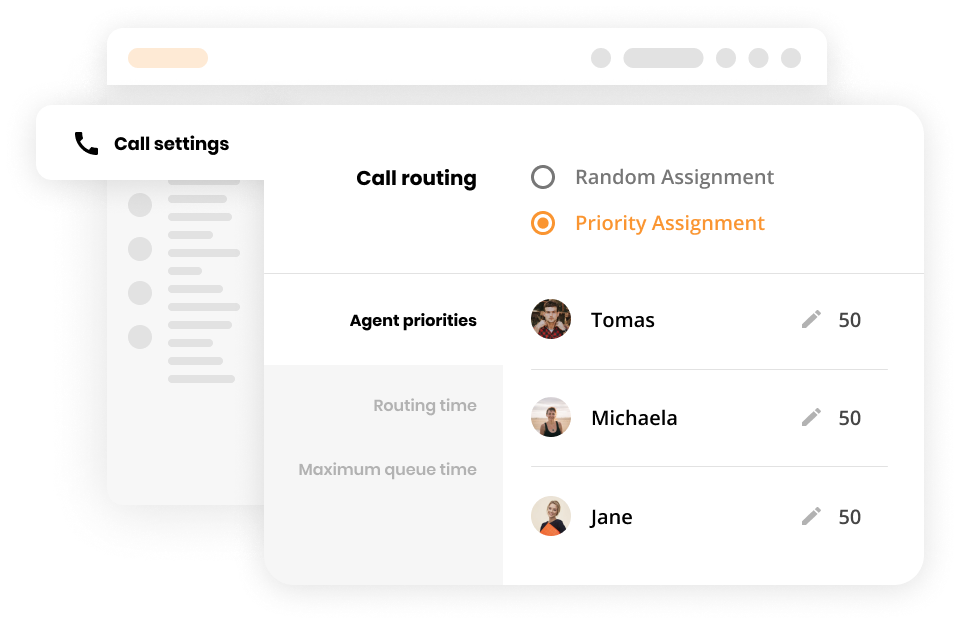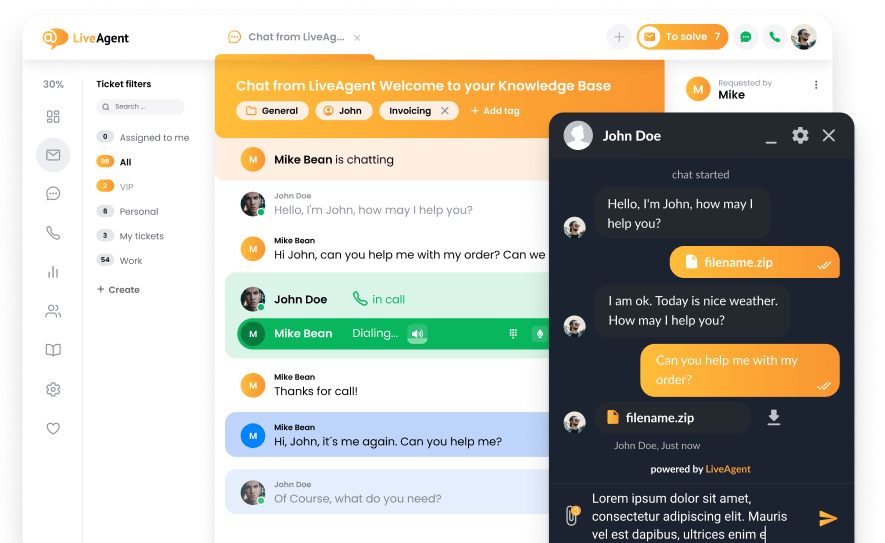“A call center is a large office in which a company employees provide information to its customers, or sell or advertise its goods or services, by phone.” Cambridge dictionary
Why are call centers important?
It is no secret that omnichannel is becoming increasingly popular these days. However, call centres remain an integral part of it. Actually, almost 90% of customers still like to talk to a live agent. Therefore, it is still crucial to provide quality customer service through a phone.
How can you improve your call center?
Managing phone support can be a significant challenge for companies. It’s typically the most time-consuming, least cost-effective, and most challenging to measure support channel. This is where call center software can play a critical role. Call center software allows businesses to manage customer communications effectively; by handling incoming and outgoing calls. Without the right software in place, customers will be left on hold when calling support. At the same time, agents usually struggle to answer queries quickly and efficiently. As a result, most of today’s help desk software solutions provide call center functionality as a part of their offerings.
Benefits of using call center software
Enhanced customer communication
When customers call your support line, they naturally want you to answer quickly and handle their requests efficiently. With automated call routing and IVR functionality of call center software, calls get automatically forwarded to the suitable agents, thus reducing wait times for customers. It ultimately resulted in improved communication and increased customer satisfaction.

Better customer service management
A reliable call center software allows you to monitor and manage every aspect of your call flow. Such as customers in the queue, the average speed answer, average talk time, number of missed/answered calls, etc. With these metrics at their disposal, managers can see how their support is performing. Thus, make well-informed decisions about the improvements needed.
Increased agent productivity and efficiency
With call center software, agents usually have instant access to a customer’s data, ranging from personal information to the customer’s purchases and the entire history of previous interactions. That enables them to interact with customers in a more timely, professional, and personalized way. Furthermore, it increases efficiency and productivity.
Added sales opportunities
Apart from answering customer calls, you can utilize call center software to drive additional sales opportunities. For example, by having a complete view of caller information such as buying habits, payment history, and product preferences, the agents can up-sell and cross-sell relevant products or services to your existing customers whenever it’s appropriate.
Improved data security
Some of the major concerns for every organization are; data security, risk of losing sensitive customer/company information. Modern call center software solutions offer advanced security features. These include data encryption, strong password policies as well as data backup. Thus, you can keep both customer and company data completely safe.
Decreased operational costs
With cloud-based call center software, you can set up and run your call center with little investment. It doesn’t require specialized hardware and capable IT professionals to manage it anymore. Since the vendor uses their servers, software, and IT team, cloud-hosted call center software solutions can help you reduce operational costs.
Types of call center software
1. On-premises call center software
On-premises call center software with on-premises call center software systems; the software, hardware, and associated infrastructure are installed at your office. Upgraded and maintained by your IT team. Thus, you retain control over all integrated systems and data. These are the most professional types of call center solutions. However, they are also the most expensive ones due to costly upfront investments for the software, hardware, licensing, and infrastructure. On the flipside, on-premises call center systems offer limited customization and integration options. This type of software doesn’t provide the same level of security and uptime as cloud-based and browser-based types.
2. Hosted call center software
Hosted call center software solutions are deployed off-site, on the provider’s premises, or a third party’s hosted site instead of the customer’s premises. The vendor maintains and accesses it through a network connection. This type of software is usually cheaper than on-premises solutions. However, they also require an upfront investment, so they are more costly than cloud-based and browser-based systems. In addition, hosted call center software needs upgrading with each new version release.
3. Cloud-based call center software
Cloud-based call center software systems are hosted online and usually accessed through an app installed on a computer or a mobile device via the internet. The data is stored in the cloud on the servers that belong to the vendor or third parties. These can be cashed, allowing users to access it offline. Cloud-based solutions are; managed by the service provider, quick to deploy, involve minimal upfront investment, and don’t require IT or staff to maintain them. This type of software offers better data security, privacy, and uptime than on-premises and hosted tools. In addition, you can easily integrate it with other business apps.
4. Browser-based call center software
Browser-based call center software is similar to cloud-based software. The main difference is the access through the internet browser rather than through an installed app. Cloud-based call center software vendors often provide a browser version of their app for the convenience of their users. These are the most cost-effective solutions and are also the easiest to implement and scale.
What is virtual call center software?
Virtual call center software is increasingly becoming adopted by many businesses across various industries. It is hosted in the cloud and works through Voice Over Internet Protocol (VOIP). A virtual call center software uses a data network to place a phone call rather than a traditional phone line. The software allows agents to manage customer calls virtually from different geographic locations instead of being centrally located in a single place, with many often working from home. Other than that, virtual call center software typically carries the same set of features as regular call center software.
Discover on your own
LiveAgent is a comprehensive help desk solution, which gathers all customer interactions into one platform. The system includes a call center, customer portal, live chat, social media customer service software, ticketing system, and more. If you would like to learn more, check out the video below for more information.

Try out LiveAgent for FREE
Handle all customer inquiries from one interface. Start improving your customer service with a 30-day free trial right away!
Frequently Asked Questions
How can you decrease operational costs?
With cloud-based call center software, you can set up and run your call center with little investment. It doesn’t require specialized hardware and capable IT professionals to manage it anymore. Since the vendor uses their servers, software, and IT team, cloud-hosted call center software solutions can help you reduce operational costs.
What is on-premises call center software?
With on-premises call center software systems, the software, hardware, and associated infrastructure are installed at your office. Upgraded and maintained by your IT team. Thus, you maintain control over all integrated systems and data.
What is virtual call center software?
Virtual call center software is hosted in the cloud and works through Voice Over Internet Protocol (VOIP). Moreover, it uses a data network to place a phone call rather than a traditional phone line.
LiveAgent monthly product update: September edition
Discover LiveAgent’s September updates: AI Draft Composer, smarter chat, better ticket filters & more to boost your support efficiency!
Powerful conversational AI agent
Empower your support with LiveAgent AI Chatbot—automate 24/7 service, boost efficiency, and delight customers. Try free for 30 days!

 Български
Български  Čeština
Čeština  Dansk
Dansk  Deutsch
Deutsch  Eesti
Eesti  Español
Español  Français
Français  Ελληνικα
Ελληνικα  Hrvatski
Hrvatski  Italiano
Italiano  Latviešu
Latviešu  Lietuviškai
Lietuviškai  Magyar
Magyar  Nederlands
Nederlands  Norsk bokmål
Norsk bokmål  Polski
Polski  Română
Română  Русский
Русский  Slovenčina
Slovenčina  Slovenščina
Slovenščina  简体中文
简体中文  Tagalog
Tagalog  Tiếng Việt
Tiếng Việt  العربية
العربية  Português
Português 




